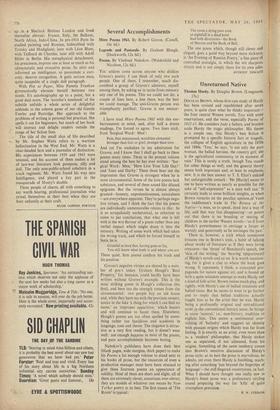Several Acconiplishments
Legends and Pastorals. By Graham Hough. (Duckworth, 12s. 6d.) Poems. By Vladimir Nabokov. (Weidenfeld and Nicolson, 12s. 6d.)
You seldom come across anyone who dislikes Graves's poetry. I can think of only two such people. One of them, I remember, much dis- comfited a group of Graves's admirers, myself among them, by asking us to recite from memory any one of his poems. This we could not do; a couple of lines here, a line there, was the best we could manage. The anti-Graves person was triumphantly justified: Graves is not memor- able.
I have read More Poems 1961 with this em- barrassment in mind, and, after half a dozen readings, I'm forced to agree. Two lines stick, from 'Surgical Ward: Men':
Pain, that unpurposed, matchless elemental
Stronger than fear or grief, stranger than love. And yet I'm unshaken in my admiration for Graves, and I know that I shall go back to these poems many times. Three in the present volume stand among the best he has ever written: 'Sur- gical Ward: Men,' Here Live Your Life Out!' and 'Joan and Darby.' These three bear out the impression that Graves is strongest when he is most circumstantial. Some of the love poems lack substance, and several of them sound like diluted epigrams. But the virtues he is almost always granted—honesty, unpretentiousness, naturalness —are everywhere apparent. They're perhaps nega- tive virtues, and I think the fact that his poems are individually unmemorable relates to this: he is so scrupulously unrhetorical, so reluctant to come to pat conclusions, that what one is left with is the wry flavour of a poem rather than any verbal impact which might drum it into the memory. Writing of some work which had taken the wrong track, and which he forced himself to burn, he is
Grateful at least that, having gone so far, You still know what truth is and where you are. These quiet, firm poems confirm his truth and his position.
Graves's negative virtues are shared by a num- ber of poets today. Graham Hough's 'Real Property,' for instance, -could hardly have been written without Graves's example. This is the most striking poem in Hough's collection (his first), and here too the strength comes from the circumstantial : two people buy an old house and, while they have tea with the previous owners, notice in the lake 'a thing for which 1 can find no name,' an 'improper apparition,' which haunts and will continue to haunt them. Elsewhere, Hough's poems are too often spoiled by some- thing rather too fastidious and academic in language, tone and theme. The elegance is attrac- tive at a very first reading, but it doesn't wear well: not enough happens in most of the poems, and pure accomplishment becomes boring.
Nabokov's publishers have done their best (blank pages, wide margins, thick paper) to make his Poems a fat enough volume to stand next to his books of prose, but the resources of even a production manager must have been strained to give these fourteen poems an appearance of solidity. Most of them are short and slight, all of them are extremely clever, sometimes over-clever; they are models of whatever one means by New Yorker poetry at its best. The first stanza of 'The Room' is typical :
The room a dying poet took at nightfall in a dead hotel had both directories—the Book
of Heaven and the Book of Bell.
The one poem which, though still clever and elegant, goes a good way beyond mere slickness, is 'An Evening of Russian Poetry,' a fine piece of controlled nostalgia, in which the wit sharpens, directs and is not simply there for its own sake.
ANTHONY THWAITS














































 Previous page
Previous page